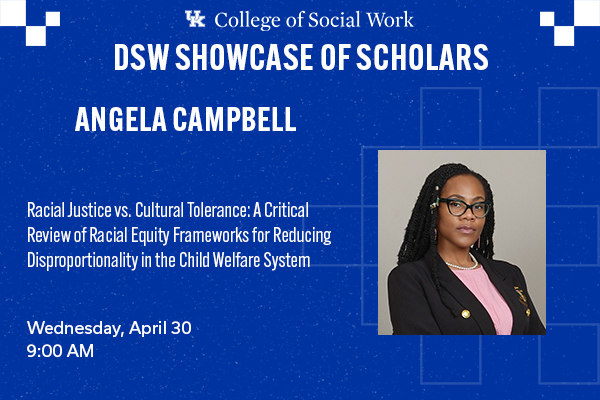DSW Candidate – Angela Campbell, 9:00 AM – 10:15 AM
$0.00
Virtual Showcase of DSW Scholars 2025 Event!
Racial Justice vs. Cultural Tolerance: A Critical Review of Racial Equity Frameworks for Reducing Disproportionality in the Child Welfare System
DSW Candidate – Angela Campbell, MSW
Wednesday, April 30, 2025
9:00 AM – 10:15 AM Eastern Time Zone
Credit Hours: This session is not eligible for CE credit
Description
Racial Justice vs. Cultural Tolerance: A Critical Review of Racial Equity Frameworks for Reducing Disproportionality in the Child Welfare System
This capstone investigates the deeply rooted historical trauma inflicted on Black families and communities by child welfare systems, highlighting the urgent need for comprehensive eradication. Although efforts to implement racial equity and anti-racist frameworks have been made, the progress in reducing the overrepresentation of Black children, youth, and families within child protective services remains inadequate. The ongoing nature of this issue continues to jeopardize the well-being and stability of Black families, a threat that has persisted for generations. Addressing this multifaceted and complex problem requires equally sophisticated strategies.
The first component, a systematic literature review, assesses the efficacy of current interventions—including anti-poverty initiatives, racial equity measures, and implicit bias training—that are being implemented across various jurisdictions to confront this enduring challenge. The second component, a conceptual paper, examines this issue through the lenses of Black Feminist Theory and Critical Race Theory to develop an integrated framework to address racial disproportionality through an intersectional lens. The third component, a practice application paper, expands upon the integrated framework proposed in the conceptual paper, offering guidance for agencies to incorporate within their child protective service programs.
Together, these three components provide a comprehensive approach to confronting this issue by identifying its roots, analyzing it from a theoretical standpoint, and ultimately addressing it by formulating innovative strategies. Moreover, adopting integrated frameworks that blend traditional interventions with contemporary technological advancements.
Learning Objectives:
Upon completion of this conference, participants will be able to:
- Examine how historical and contemporary injustices reveal parallels between slavery, segregation, and systemic racism in the disproportionate involvement of Black families in the child welfare system. These inequities underscore the multi-generational impact on Black families, perpetuating cycles of disadvantage within social institutions.
- Understand how to integrate Critical Race Theory and Black Feminist Theory through an intersectional lens, which is vital for analyzing the impact of child welfare systems on Black families. This perspective reveals how race, gender, and class intersect in their experiences. Poverty is often weaponized against these families, with neglect allegations justifying child removals while ignoring systemic barriers that lead to financial instability. This trend reinforces cycles of disadvantage instead of addressing the root causes of hardship.
- Understand how the ethical use of technology to devise innovative strategies aimed at reducing racial disproportionality must be developed, managed, and assessed through a racial equity lens to prevent exacerbating existing disparities. Individuals across various roles—such as social workers, policymakers, and community activists—can engage in anti-racist practices in their daily activities to advance these efforts at micro, macro, and mezzo levels.
Delivery Method: Live Interactive Training via Zoom Video Conferencing
Credit Hours: This session is not eligible for CE credit
Target Audience: This conference is intended for social workers and students.
Accreditation: University of Kentucky College of Social Work, Provider # 1377, is approved as an ACE provider to offer social work continuing education by the Association of Social Work Boards (ASWB) Approved Continuing Education (ACE) program. Regulatory boards are the final authority on courses accepted for continuing education credit. ACE provider approval period: 9/29/22-9/29/25. Social workers participating in this conference will receive up to 15 general continuing education credits.
Claiming CE Credit: Instructions for claiming CE credit will be disseminated at the beginning of each session.
Questions: If you have any questions regarding CE credit or to report a grievance, please contact Christina Krantz at Christina.Krantz@uky.edu. For technical assistance, please contact lmshelp@uky.edu.
Disclaimer: The views and opinions expressed in these presentations are those of the individual presenters and do not necessarily reflect the official policies or positions of the University of Kentucky or the College of Social Work. The inclusion of any topics, perspectives, or discussions is intended for academic engagement and does not constitute endorsement by the institution.
